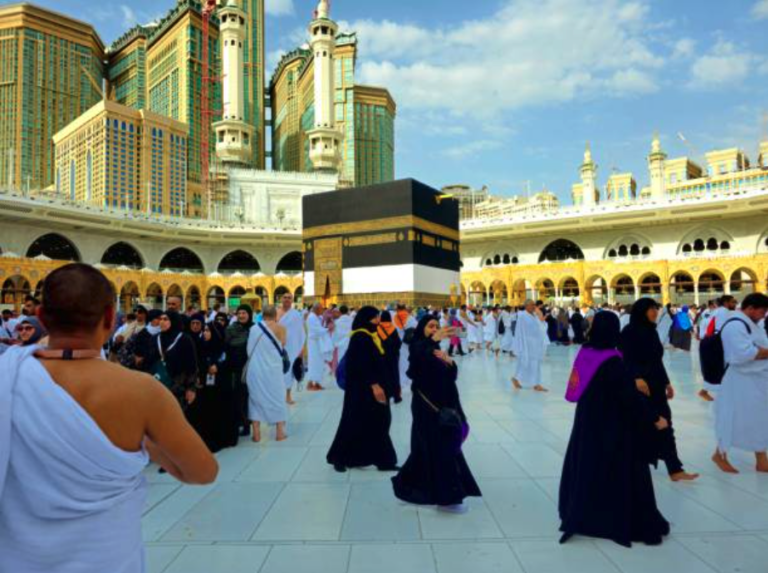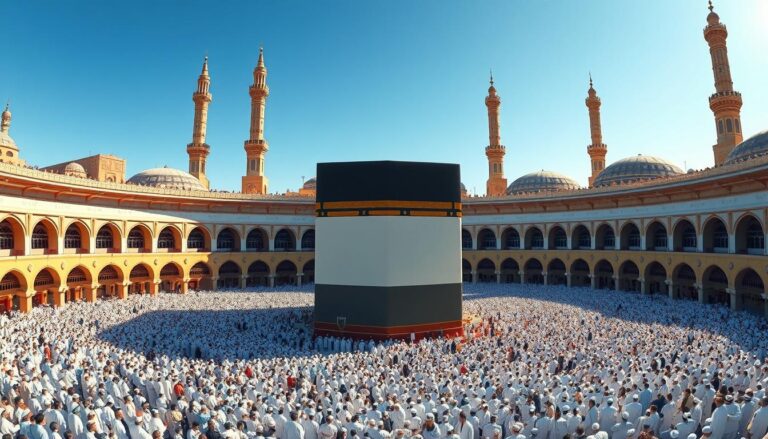The Islamic Approach to Environmental Stewardship
Can Islam offer a unique solution to our global environmental crisis? As the world faces climate change and ecological damage, this question is more important than ever. Islamic environmentalism, based on Quranic teachings, offers a strong framework for living sustainably and eco-friendly.
The Islamic view on the environment is unique. It stresses justice, moderation, and balance between humans and nature. This approach, known as “Green Deen,” or eco-friendly Islam, guides us in tackling our planet’s environmental issues.
In 2015, the Islamic Declaration on Climate Change was made in Istanbul. It outlined a moral path for a future with less emissions and more resilience to climate change. This, along with other initiatives like Al-Mizan from the Muslim Council of Elders, shows the Islamic world’s growing dedication to protecting the environment.
The Quran sees environmental problems as signs of a deeper moral and ethical crisis. By following Islamic principles of environmental care, we can strive for a sustainable future that benefits all of creation.
Key Takeaways
- Islamic environmentalism offers a unique approach to sustainable development
- The Quran views nature as a sign of the Creator and humans as stewards of the Earth
- The concept of “Green Deen” promotes eco-friendly practices in daily life
- Islamic principles emphasize balance and responsible resource management
- Initiatives like Al-Mizan demonstrate global Muslim commitment to environmental protection
- Islamic law recognizes nature as belonging to all living things, not just humans
Understanding the Islamic Perspective on Nature and Creation
The Islamic view of nature comes from the Quran and Prophet Muhammad’s teachings. It shows how all things are connected and how humans must care for the Earth.
The Quranic View of Earth as a Sign of the Creator
In Islam, the Earth is a deep sign of Allah’s creation. The Quran talks about “Earth” 485 times, showing its importance. It also mentions water about 60 times, highlighting its role in keeping life going.
The Concept of Humans as Stewards of the Earth
In Islam, humans are seen as caretakers of the Earth. This role is more important as the world’s population grows. Islamic teachings guide us on living in harmony with nature, with over 750 verses about it.
Balance and Proportion in Islamic Environmental Ethics
Islamic teachings focus on balance and proportion in nature. The Quran warns against upsetting this balance, saying human actions can harm the land and sea. It teaches moderation, conservation, and sharing to help the environment and society.
“Eat and drink, but waste not by excess; indeed He (Allah) likes not the wasters.” – Quran 7:31
This verse shows Islam’s view on using resources wisely. It encourages a balanced life and warns against waste. By following these teachings, Muslims can help protect the environment and live sustainably.
Quranic Teachings on Environmental Conservation
The Quran gives deep insights into taking care of our planet. It has about 200 verses about nature and protecting the Earth. These teachings remind us that taking care of the Earth is a sacred duty.
Islamic teachings say that all living things are connected. The Quran says in Surah Al-An’am, “And there is no creature on the Earth or bird that flies with its wings except that they are communities like you.” This shows how important it is to respect all life.
Being moderate is key in Islamic teachings about the environment. Surah Al-A’raf tells us not to waste, saying, “Do not waste, for indeed, the wasteful are brothers of the devils.” This means we should use resources wisely and not waste them.
“It is He who has made you successors upon the Earth” – Surah Al-Baqarah (2:30)
This verse tells us that we are responsible for the Earth. It urges Muslims to protect the environment for those who come after us. The Quran also talks about the harm we can cause to the environment in Surah Ar-Rum, showing how our actions affect the Earth.
- Promote equitable resource distribution
- Encourage sustainable use of Earth’s resources
- Emphasize the interconnectedness of all creation
- Warn against environmental destruction
These teachings from the Quran are the basis of Islamic views on the environment. They motivate Muslims everywhere to work on conservation and live sustainably.
The Concept of “Green Deen” in Islamic Environmentalism
Green Deen is a blend of Islamic faith and caring for the environment. Introduced by Ibrahim Abdul Matin in 2010, it has changed how Muslims live green. His book, “The Green Deen: What Islam Teaches about Protecting the Planet,” started a movement.
Defining “Green Deen” and its Significance
Green Deen means taking care of the Earth is part of being Muslim. It teaches us to see the planet as a sacred gift. This idea has made many Muslims around the world want to help the environment.
Practical Applications in Daily Life
Green Deen shows up in many ways in our daily lives:
- Reducing waste and saving resources
- Choosing green ways to travel
- Supporting businesses that are good for the planet
- Helping out in community clean-up efforts
These actions show our dedication to taking care of the Earth, based on Islamic teachings.
The Role of Islamic Institutions
Mosques and Islamic centers are key in spreading Green Deen. They use solar power, save water, and recycle. These places are leaders in caring for the environment, encouraging others to do the same.
“The faith community needs to be involved in the green movement.” – Ibrahim Abdul Matin
Matin’s idea of Green Deen keeps inspiring Muslims everywhere. It’s creating a new generation of believers who care about the planet.
Islamic Principles of Sustainable Living
Sustainable living in Islam comes from the Quran and the Prophet Muhammad’s life. It teaches us to protect nature and keep the environment balanced. Humans are seen as caretakers of the Earth, called ‘khalifah’ in Islam.
The Quran talks about taking care of the Earth in Surah Al-An’am, verse 165. It reminds us we are successors on Earth. We must manage resources well and use them wisely. The Prophet Muhammad also taught us to plant trees and save water.
- Waste reduction: Islam discourages excessive consumption and wastefulness
- Water conservation: Prophet Muhammad emphasized preserving water even near flowing rivers
- Tree planting: Considered a charitable act with rewards in the afterlife
- Land reclamation: Bringing dead land to life through cultivation is praised
Islamic teachings also protect wildlife. The idea of ‘hima’ zones helps keep wildlife areas safe. These zones limit industrial growth and grazing to protect nature.
“If a Muslim plants a tree or sows seeds, and then a bird, person, or animal eats from it, it is considered a charitable gift (Sadaqah).” – Sahih Muslim
Sustainable living in Islam also means good economic practices. It warns against usury and encourages giving to others. This helps Muslim communities be more socially and economically sustainable. By following these teachings, Muslims can help make the world more environmentally friendly and sustainable.
The Islamic Approach to Environmental Stewardship
Islam offers a complete plan for taking care of the environment, based on the Qur’an. This holy book, given over 1400 years ago, gives us timeless advice on how to manage resources and care for the Earth.
Humans as Trustees of the Earth
The Qur’an says humans are khalifah (trustees) of the Earth. This idea, found in Qur’an 2:30, highlights our important duty to protect and care for our planet. As caretakers, we must manage Earth’s affairs in line with Allah’s will.
Balancing Development and Environmental Protection
Islamic teachings aim for a balance between growth and conservation. The Qur’an talks about mizan (balance) in nature. This idea helps Muslims to grow while keeping ecosystems and biodiversity safe.
Islamic Teachings on Resource Management
Islam teaches us to manage resources wisely. The Qur’an encourages us to use Earth’s gifts sustainably, with fairness and respect for nature. It also warns against waste and tells us to use resources carefully, for the benefit of future generations.
“And it is He who has made you successors upon the earth.” – Qur’an 6:165
This verse reminds us of our duty to protect the Earth, inspiring Muslims to care for the environment. By following these teachings, we can make our world more sustainable and peaceful.
Environmental Ethics in Islam: Protecting Biodiversity and Ecosystems
Islamic teachings stress the importance of protecting our planet’s biodiversity and ecosystems. The Quran says every living thing has value and helps us worship God. This idea is key to understanding biodiversity protection in Islam.
The Islamic view on the environment is unique. It promotes fairness, reducing consumption, and living in harmony with nature. The Quran reminds us that we are caretakers of the Earth, tasked with its preservation.
Human activities have caused big problems like habitat loss, biodiversity decline, and climate change. Muslim leaders have stepped up. In 2015, they made a declaration in Istanbul to guide us towards a climate-resilient future.
Researchers suggest a model to tackle climate change and sustainability:
- Green activism (Jihad)
- Green innovation (Ijtihad)
- Green lifestyle (Zohd)
This Green JIZ model supports moving towards a sustainable economy. It encourages innovation inspired by nature and culture, following Islamic values of environmental care.
Education is vital in teaching us to care for the environment. It helps create a society that sees itself as guardians, not just users, of nature. This fits with Islamic teachings and helps protect biodiversity.
Muslim Eco-Theology: Bridging Faith and Environmental Science
Muslim eco-theology combines Islamic teachings with environmental science. It offers a unique view on caring for the environment, blending faith and science.
Integrating Islamic Teachings with Environmental Science
Islamic environmental science uses the Quran and science together. The Quran talks about using resources wisely and not wasting them. It also says humans must protect nature for the future.
Contributions of Eco-Islamic Scholars
Eco-Islamic scholars help link faith and science. They explain religious texts in a way that shows how to live sustainably. They talk about the Quran’s idea of balance in nature and our duty to protect it.
Islamic Educational Institutions and Environmental Awareness
Islamic schools are now teaching about the environment. In Indonesia, the Ekopesantren Program trains teachers in Islamic schools. It aims to teach 50,000 students in Java and Sumatra about caring for the environment.
- 36,000 Islamic boarding schools in Indonesia
- 5 million students enrolled
- 100 teachers to be trained in eco-Islam
Muslim eco-theology is changing how Islamic communities learn about the environment. It mixes faith and science to teach a new generation to care for the planet.
Faith-Based Environmental Activism in the Muslim World
Islamic environmental activism is growing worldwide. Muslim eco-initiatives are tackling big ecological problems. EnviroMuslims, started in 2019, aims to get Canadian Muslims involved in green living.
EnviroMuslims introduced the Greening Canadian Mosques program in 2021. It helps mosques cut down on emissions and teaches about caring for the environment. The group also offers a bootcamp series for Muslim groups to add sustainability to their work.
The United Nations Environment Assembly launched Al-Mizan: A Covenant for the Earth. This important document shares Islam’s ecological teachings. It involves many Islamic thinkers and tackles big issues like climate change and biodiversity loss.
- Al-Mizan was written by Islamic eco-theologians and practitioners from all over
- More than 300 Islamic and international groups reviewed it
- It talks about things like population growth, energy, and genetic modified organisms
These efforts show Muslims’ growing dedication to protecting the environment. By mixing faith with science, Islamic activism is leading to a greener future.
Conclusion: The Future of Islamic Environmentalism
The future of eco-Islam looks bright as more people join the Islamic environmental movement. Islamic teachings bring a fresh view to solving global environmental problems. By mixing faith with science, we find new ways to tackle big issues.
Islamic environmentalism is all about caring for the earth, seeing everything as connected, and finding balance. These ideas match what we need to do to save our planet. With rich countries using most of the world’s energy, Islamic teachings on using resources wisely are more important than ever.
The Islamic environmental movement is already making a difference. It focuses on saving water, growing food in a green way, and buying things that are good for the planet. Mosques and Islamic groups are showing the way by being eco-friendly and teaching others about caring for the earth.
Looking ahead, Islamic environmentalism has the power to motivate millions of Muslims. By following the teachings of khilafah (stewardship) and wasatiyyah (moderation), we can fight climate change and protect our planet. The future of eco-Islam depends on combining faith and science to raise a green-conscious generation.
Source Links
- Islamic Scholars unveil Islamic approach to environmental stewardship at UNEA-6 – MyJoyOnline
- Environmental Sustainability in Islam | EcoMENA
- Caretakers of the Earth: An Islamic Perspective — Khaleafa
- Guardians of Creation: Islam and Environmental Stewardship
- What the Quran Says about Environmental Activism
- What Does the Quran Say About the Environment?
- Environmental Stewardship in the Quran
- 9781605094649.pdf
- The Timeless Legacy of ‘The Green Deen,’ an Exploration of Islam and Environmentalism
- Islamic Principles Of Sustainable Living: How Faith Encourages Environmental Stewardship
- Islamic view on sustainability
- Environmental Sustainability Through the Lens of Islamic Ethics – Tazkiyah
- Spirituality, Sustainability, and the Environment: An Islamic Perspective | eePRO
- What/Who is Khalifah in Islam? — Green Islam
- How Islam can represent a model for environmental stewardship
- When the Earth Speaks Against Us: Environmental Ethics in Islam | Yaqeen Institute for Islamic Research
- Islam’s Perspective on Environmental Sustainability: A Conceptual Analysis
- How Islamic Schools Are Teaching Children to Love the Environment
- No title found
- A Covenant for the Earth” Unveils an Islamic Approach to Environmental Stewardship at the United Nations Environment Assembly
- Environmental Education through Islamic Lens: Values and Practices







